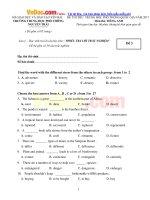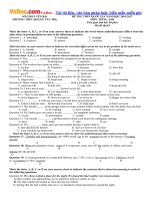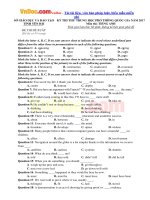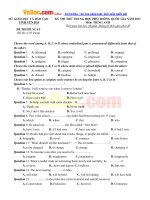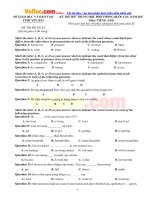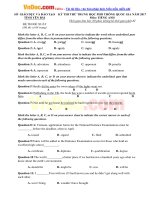Tải Đề thi thử THPT Quốc gia năm 2017 môn Tiếng Anh trường THPT Hồng Quang, Yên Bái CÓ ĐÁP ÁN (3) - Thư viện Đề thi thử THPT Quốc gia năm 2017 môn Tiếng Anh
Bạn đang xem bản rút gọn của tài liệu. Xem và tải ngay bản đầy đủ của tài liệu tại đây (131.86 KB, 7 trang )
<span class='text_page_counter'>(1)</span><div class='page_container' data-page=1>
<b>SỞ GIÁO DỤC VÀ ĐÀO TẠO</b>
<b> TỈNH YÊN BÁI</b>
<b>ĐỀ THI ĐỀ XUẤT</b>
<i>(Đề thi có 05 trang)</i>
<b>KỲ THI THỬ TRUNG HỌC PHỔ THƠNG QUỐC GIA NĂM 2017</b>
<b>Mơn: TIẾNG ANH</b>
<i>Thời gian làm bài: 60 phút, không kể thời gian phát đề</i>
<i><b>Mark the letter A, B, C, or D on your answer sheet to indicate the word whose underlined part differs </b></i>
<i><b>from the other three in pronunciation in each of the following questions</b></i>
<b>Question 1:</b> <b> A. phoned</b> <b>B. jumped</b> <b>C. composed</b> <b>D. loved</b>
<b>Question 2: </b> A. digest <b>B. biologist</b> <b>C. curriculum</b> <b>D. certificate</b>
<i><b>Mark the letter A, B, C, or D on your answer sheet to indicate the word that differs from the other three </b></i>
<i><b>in the position of primary stress in each of the following questions</b></i>
<b>Question 3: </b> <b>A. supportive</b> <b>B. different</b> <b>C. confide</b> <b>D. contractual</b>
<b>Question 4: A. optimistic</b> <b>B. enthusiast</b> <b>C. education</b> <b>D. personality</b>
<i><b>Mark the letter A, B, C, or D on your answer sheet to indicate the underlined part that needs correction </b></i>
<i><b>in each of the following questions</b></i>
<b>Question 5: Susan stopped to write her letter because she had to leave for the hospital</b>
<b> </b> <b>A B C D</b>
<b>Question 6: We didn’t have many knowledge about physics.</b>
<b> </b> <b> A B C D</b>
<b>Question 7: We were advised not drinking the water in the bottle.</b>
<b> </b> <b> A. B C D</b>
<i><b>Mark the letter A, B, C, or D on your answer sheet to indicate the correct answer to each of the following</b></i>
<i><b>questions</b></i>
<b>Question 8: They haven’t met her again since she______ school ten years ago. </b>
<b>A. have left </b> <b>B. leave </b> <b>C. left </b> <b>D. had left </b>
<b>Question 9: A recent survey has shown that ______ increasing numbers of men are willing to share the </b>
housework with their wives.
<b>A. a </b> <b>B. an </b> <b>C. the</b> <b>D. some </b>
<b>Question 10: The more demanding the job is, ______ I like it.</b>
<b> A. more </b> <b>B. most</b> <b>C. the more </b> <b>D. the most</b>
<b> Question 11: Hung wanted to know ______ in his shop.</b>
<b> A. there were how many people </b> <b>B. how many people were there</b>
<b> C. were there how many people</b> <b>D. how many people there were </b>
<b>Question 12: Richard, my friend, _______ in World War II. </b>
<b>A. says to fight </b> <b>B. says to have fought</b> <b>C. is said to fight</b> <b> D. is said to have fought </b>
<b>Question 13: Students are ______ less pressure as a result of changes in testing procedures. </b>
<b>A. under </b> <b>B. above</b> <b> C. upon</b> <b> D. out of</b>
<b> Question 14: Tom is getting ever keener on doing research on ______.</b>
<b> A. biology</b> <b> B. biological</b> <b> C. biologist</b> <b> D. biologically</b>
<b> Question 15: Our house wants_______. </b>
<b>A. to be decorated B. decorating</b> <b>C. to decorate</b> <b>D. A&B are correct</b>
<b> Question 16: A number of young teachers nowadays ______ themselves to teaching disadvantaged </b>
children.
</div>
<span class='text_page_counter'>(2)</span><div class='page_container' data-page=2>
<b>Question 17: Whistling or clapping hands to get someone‘s attention is considered ______ and even rude in</b>
some circumstances.
<b>A. suitable</b> <b> B. unnecessary</b> <b> C. appropriate</b> <b> D. impolite</b>
<b>Question 18: “Sorry for being late. I was ______ in the traffic for more than an hour” </b>
<b>A. carried on </b> <b>B. held up </b> <b>C. put off</b> <b> D. taken after</b>
<b> Question 19: I prefer_________ to_______. </b>
<b> A. walking-cycle</b> <b>B. walk-cycle</b> <b>C. walking-cycling</b> <b>D. to walk-cycling</b>
<i><b>Mark the letter A, B, C, or D on your answer sheet to indicate the most suitable response to complete </b></i>
<i><b>each of the following exchanges. </b></i>
<b>Question 20: Maria: "Thanks for the lovely evening." </b>
Diana: "______."
<b>A. No, it's not good B. Oh, that's right C. Yes, it's really great D. I'm glad you enjoyed it </b>
<b>Question 21 : Kim: "What ______ this weekend?" </b>
Sally: "Oh, we're going windsurfing. It's fantastic!"
<b>A. do you go </b> <b>B. are you doing </b> <b>C. are you going </b> <b>D. would you do </b>
<i><b>Mark the letter A, B, C, or D on your answer sheet to indicate the word(s) CLOSEST in meaning to the </b></i>
<i><b>underlined word(s) in each of the following questions.</b></i>
<b> Question 22: Students are expected to always adhere to school regulations.</b>
<b> A. question </b> <b>B. violate </b> <b>C. disregard</b> <b> D. follow </b>
<b>Question 23: A number of programs have been initiated to provide food and shelter for the underprivileged </b>
in the remote areas of the country.
<b> A. rich citizens </b> <b>B. active members </b> <b>C. poor inhabitants D. enthusiastic people </b>
Mark the letter A, B, C, or D on your answer sheet to indicate the word(s) OPPOSITE in meaning to the
underlined word(s) in each of the following questions.
Question 24: Drivers are advised to get enough petrol because filling stations are few and far between on
the highway.
<b> A. easy to find </b> <b>B. difficult to access C. unlikely to happen D. impossible to reach</b>
<b> Question 25: We managed to get to school in time despite the heavy rain.</b>
<b> A. earlier than a particular moment</b> <b> B. later than expected </b>
<b>C. early enough to do something </b> <b>D. as long as expected </b>
<i><b>Mark the letter A, B, C, or D on your answer sheet to indicate the sentence that is closest in meaning to </b></i>
<i><b>each of the following questions.</b></i>
<b>Question 26: It is believed that the man escaped in a stolen car.</b>
<b>A. The man is believed to have escaped in a stolen car. </b>
<b>B. The man is believed to be escaped in a stolen car. </b>
<b>C. The man was believed to be escaped in a stolen car.</b>
<b>D. They believed that the man stole the car.</b>
<b>Question 27: They spent a lot of money on food and clothes.</b>
<b>A. A lot of money was spent on food and clothes. </b>
<b> B. A lot of money were spent on food and clothes. </b>
<b>C. A lot of money on food and clothes were spent. </b>
<b>D. Money was spent a lot on food and clothes. </b>
</div>
<span class='text_page_counter'>(3)</span><div class='page_container' data-page=3>
<b>B. The thieves wore gloves so that not leave any fingerprints.</b>
<b>C. The thieves wore gloves in order not to leave any fingerprints.</b>
<b>D. The thieves wore gloves in order to not leave any fingerprints.</b>
<b>Question 29: “ Don’t forget to phone the police,” she saiD.</b>
<b>A. She reminded him not forget to phone the police.</b>
<b>B. She told him to forget not to phone the police.</b>
<b>C. She reminded him to phone the police. </b>
<b>D. She reminded him about phoning the police.</b>
<b>Question 30: The coffee was too hot for me to drink.</b>
<b>A. The coffee is so hot that I can’t drink it. B. The coffee is so hot that I can’t drink.</b>
<b>C. The coffee was so hot that I couldn’t drink. D. The coffee was so hot that I couldn’t drink it.</b>
<i><b>Read the following passage and mark the letter A, B, C, or D on your answer sheet to indicate the correct</b></i>
<i><b>word or phrase that best fits each of the numbered blanks from 31 to 35. </b></i>
Nowadays people are more aware that wildlife all over the world is in danger. Many species of
animals are threatened, and could easily become (41)...if we do not make an effort to protect them.
There are many reasons for this. In some cases, animals are hunted for their fur or for other valuable parts of
their bodies. Some birds, (42)...as parrots are caught alive and sold as pets. For many animals and
birds, the problem is that their habitat-the place where they live-is disappearing. More (43)...is used for
farms, for houses or industry, and there are fewer open spaces than there once were. Farmers use powerful
chemicals to help them grow better crops, but these chemicals pollute (44)...the environment and harm
wildlife. The most successful animal on earth-human beings-will soon be the only ones left, (45)...we
can solve this problem.
31. <b>A. extinct</b> <b>B. lost</b> <b>C. empty</b> <b>D. disappeared</b>
32. <b>A. such</b> <b>B. where</b> <b>C. like</b> <b>D. or</b>
33. <b>A. area</b> <b>B. earth</b> <b>C. land</b> <b>D. soil</b>
34. <b>A. the</b> <b>B. that</b> <b>C. an</b> <b>D. a</b>
35. <b>A. because</b> <b>B. however</b> <b>C. if</b> <b>D. unless</b>
<i><b>Read the following passage and mark the letter A, B, C, or D on your answer sheet to indicate the correct</b></i>
<i><b>answer to each of the questions from 36 to 42. </b></i>
</div>
<span class='text_page_counter'>(4)</span><div class='page_container' data-page=4>
(Source: Reading Challenge 2, Casey Malarcher & Andrea Janzen, Compass Publishing)
<b>Question 36: The beverages mentioned in the first paragraph aim to give consumers</b>
<b>A. caffeine </b> <b>B. sugar </b> <b>C. more energy </b> <b>D. more choices </b>
<b>Question 37: The word “it” in the second paragraph refers to </b>
<b>A. one example </b> <b>B. the company </b> <b>C. Red Bull </b> <b>D. thirst quencher</b>
<b>Question 38: According to the passage, what makes it difficult for researchers to know if an energy drink </b>
gives people energy?
<b>A. Natural chemicals in a person‘s body</b> <b> B. The average age of the consumer</b>
<b>C. The number of beverage makers </b> <b>D. The mixture of various ingredients </b>
<b>Question 39: The word -plausible- in the passage is closest in meaning to</b>
<b>A. impossible </b> <b>B. reasonable </b> <b>C. typical </b> <b>D. unlikely </b>
<b>Question 40: What has Dr. Bauer probably researched? </b>
<b>A. Countries where Red Bull is popular </b> <b>B. Energy drinks for teenage athletes </b>
<b>C. Habits of healthy and unhealthy adults </b> <b>D. Vitamins and chemicals in the body </b>
<b>Question 41: Which of the following is NOT true according to the passage? </b>
<b>A. Bauer does not seem to believe the claims of energy drink makers. </b>
<b>B. Colas have been on the market longer than energy drinks. </b>
<b>C. It has been scientifically proved that energy drinks work. </b>
<b>D. The makers of Red Bull say that it can revitalize a person. </b>
<b>Question 42: What is the main idea of this passage? </b>
<b>A. Caffeine is bad for people to drink. </b> <b>B. It is uncertain whether energy drinks are healthy. </b>
<b>C. Red Bull is the best energy drink. </b> <b>D. Teenagers should not choose energy drinks.</b>
<i><b> Read the following passage and mark the letter A, B, C, or D on your answer sheet to indicate the </b></i>
<i><b>correct answer to each of the questions from 43 to 50. </b></i>
What is “extreme” weather? Why are people talking about it these days? “Extreme” weather is an
unusual weather event such as rainfall, a drought or a heat wave in the wrong place or at the wrong time. In
theory, they are very rare. But these days, our TV screens are constantly showing such extreme weather
events. Take just three news stories from 2010: 28 centimetres of rain fell on Rio de Janeiro in 24 hours,
Nashville, USA, had 33 centimetres of rain in two days and there was record rainfall in Pakistan. The effects
of this kind of rainfall are dramatic and lethal. In Rio de Janeiro, landslides followed, burying hundreds of
people. In Pakistan, the floods affected 20 million people. Meanwhile, other parts of the world suffer
devastating droughts. Australia, Russia and East Africa have been hit in the last ten years. And then there
are unexpected heat waves, such as in 2003 in Europe. That summer, 35,000 deaths were said to be
<b>heat-related. So, what is happening to our weather? Are these extreme events part of a natural cycle? Or are they</b>
caused by human activity and its effects on the Earth‘s climate? Peter Miller says it‘s probably a mixture of
both of these things. On the one hand, the most important influences on weather events are natural cycles in
the climate. Two of the most famous weather cycles, El Niño and La Niña, originate in the Pacific Ocean.
<b>The heat from the warm ocean rises high into the atmosphere and affects weather all around the world. On</b>
the other hand, the temperature of the Earth‘s oceans is slowly but steadily going up. And this is a result of
human activity. We are producing greenhouse gases that trap heat in the Earth‘s atmosphere. This heat
warms up the atmosphere, land and oceans. Warmer oceans produce more water vapour – think of heating a
pan of water in your kitchen. Turn up the heat, it produces steam more quickly. Satellite data tells us that the
water vapour in the atmosphere has gone up by four percent in 25 years. This warm, wet air turns into the
rain, storms, hurricanes and typhoons that we are increasingly experiencing. Climate scientist, Michael
Oppenheimer, says that we need to face the reality of climate change. And we also need to act now to save
lives and money in the future.
</div>
<span class='text_page_counter'>(5)</span><div class='page_container' data-page=5>
<b> A. becoming more common</b> <b>B. not a natural occurrence </b>
<b>C. difficult for scientists to understand </b> <b>D. killing more people than ever before </b>
<b>Question 44: The word lethal in the second paragraph probably means ______. </b>
<b>A. far-reaching</b> <b> B. long-lasting </b> <b>C. happening soon </b> <b>D. causing deaths </b>
<b>Question 45: What caused thousands of deaths in 2003?</b>
<b>A. a period of hot weather </b> <b>B. floods after a bad summer </b>
<b>C. a long spell of heavy rain </b> <b>D. large-scale landslides </b>
<b>Question 46: According to the passage, extreme weather is a problem because ______.</b>
<b> A. we can never predict it </b> <b>B. it only affects crowded places</b>
<b> C. it‘s often very destructive </b> <b>D. its causes are completely unknown</b>
<b> Question 47: The word that in the third paragraph refers to ______. </b>
<b>A. Earth‘s oceans </b> <b>B. human activity </b> <b>C. greenhouse gases </b> <b>D. Earth‘s atmosphere</b>
<b>Question 48: Extreme weather can be caused by ______. </b>
<b>A. satellites above the Earth </b> <b>B. water vapour in the atmosphere </b>
<b>C. very hot summers </b> <b>D. water pans in your kitchen</b>
<b> Question 49: Satellites are used to ______. </b>
<b>A. change the direction of severe storms </b>
<b>B. trap greenhouse gases in the atmosphere </b>
<b>C. measure changes in atmospheric water vapour </b>
<b>D. prevent climate from changing quickly </b>
<b>Question 50: Which statement is NOT supported by the information in the passage? </b>
<b>A. Extreme weather is substantially influenced by human activity. </b>
<b>B. Unusual weather events are part of natural cycles. </b>
<b>C. We can limit the bad effects of extreme weather. </b>
</div>
<span class='text_page_counter'>(6)</span><div class='page_container' data-page=6>
<b>ĐÁP ÁN</b>
<b>Câu</b> <b>Đáp án</b> <b>Câu</b> <b>Đáp án</b>
1 D 26 A
2 A 27 A
3 B 28 C
4 B 29 C
5 A 30 D
6 B 31 A
7 B 32 A
8 C 33 C
9 B 34 A
10 C 35 D
11 D 36 C
12 D 37 C
13 A 38 D
14 A 39 A
15 D 40 D
16 D 41 C
17 D 42 B
18 B 43 A
</div>
<span class='text_page_counter'>(7)</span><div class='page_container' data-page=7>
20 D 45 A
21 A 46 C
22 D 47 C
23 C 48 B
24 A 49 C
</div>
<!--links-->
